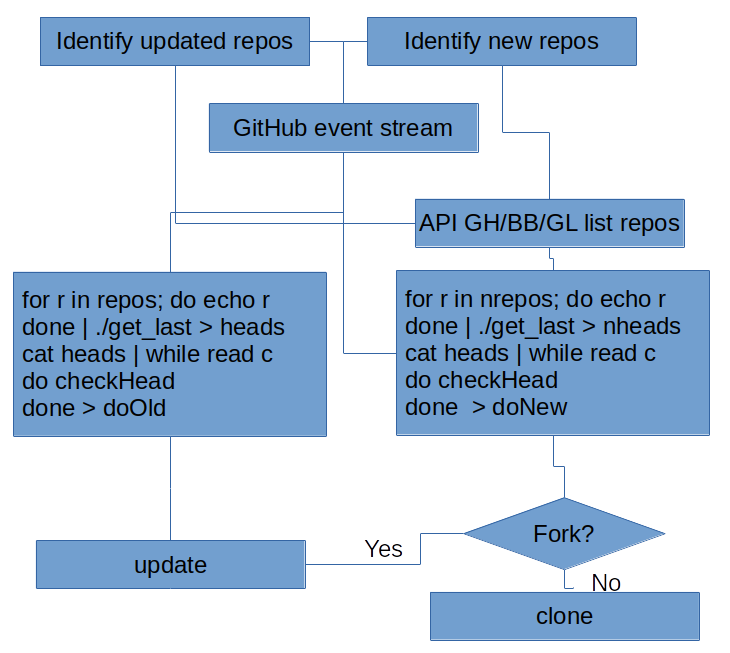Fork of libgit2 to do advanced synchronization with remotes using custom backents
The problem that is addressed is how to get the latest data from remote git repositories on a large scale?
Git cli allows cloning repos where all objects are retrieved, or fetch operation where only objects not in the current repo are retrieved from remote. Since clooning all public repos in short time is rather slow and inefficient we try another approach:
- Detecting updated repos
- Detecting new repos
- Cloning new repos and extracting objects from the cloned repos
- Fetching new objects from updated repos
The figure depicting the process is below

Many ways to detect updated repos. An approach that is forge agnostic is to rely on git itself.
Forge specific ways to identify updated repos include usage of github, gitlab, bitbucket, etc APIs to retrieve the data as noted in the chart above.
Identifying new repos always requires use of forge-specific APIs.
The code here can be run on an individual cloud machine or on the ACF cluster.
This is focused on getting objects that are noy in WoC yet and assumes that we have identified new/updated repositories using code in swsc/gather container
The script provided here:
- captureObjects.sh clones the repositories and lists objects in them
checks witch objects are missing, and then extracts them
Another approach to do the same but in a batch mode can be accomplished (on, e.g., ACF)
- doA.sh - clones all repos in a list.XX (keep it < 50K) into Q.XX folder
- run.pbs - lists all objects in these repos
- run1.pbs - extracts objects in the list todo (obtained by filtering the extracted objects against the ones in WoC)
to build
mkdir build && cd build
cmake .. -DCMAKE_INSTALL_PREFIX=$HOME
cmake --build .
cmake --build . --target installTODO
With over 1B commits already collected, the new activity represents but a small part of the entire database. Hence cloning updated (and new) repositories is inefficient and slow. 40M URLs can be checked in 24 hours using git_last running in parallel on 60 servers. The time to clone these would require months and three orders of magnitude more more network bandwith and storage.
What needs to be done is, as in case of git_last, insert additional logic to git fetch protocol in order to use custum backend that comprises git objects from all repositiories and not from a single repository as git fetch assumes. git_last implememnts the first step in git fetch protocol which obtains the heads of the remote. The next step (comparing remotes to what is locally available and sending the latest commits corresponding to each updated head is yet to be implemented.
The database backend will take a project as a parameter and return the list of heads. These heads needed to be sent to the remote so that it can calculate of set of commits (and related trees/blobs) to transfer back.